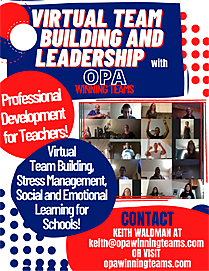Are You Ready to Play Your Best?
By Keith Waldman, Optimal Performance Associates, LLC & NicoleWood, Temple University Download Preparation.pdf
For many athletes, competition can be stressful when it should be fun. Last minute self-doubts often alter an athlete’s focus that can last from before the first whistle to the final second of competition, and for no other reason than insufficient pre-competition planning or Pre-game Preparation. Mental Pre-game Preparation is one of the most powerful tools to help you play with confidence. Many games are won or lost because of mental and physical preparation or the lack of preparation. The goal of mental preparation is to put you in a mind-set that enables you to play your best game or match. Usually this mind-set is a combination of feeling pumped up, relaxed, focused, confident, loose, and excited.
Take Responsibility for Your Preparation
Whether you are a coach or player only you are responsible for your mental preparation. Your teammates or friends cannot do this for you. Relying on outside forces to get you mentally prepared will lead to inconsistent performances. With a few simple concentration techniques before athletes arrive at the field last minute self-doubts and out of character competition mistakes can be eliminated. Here are three simple steps you can take to make sure you are ready for your next competition:
-
Establisha Routine
A well thought out routine helps take the randomness out of your preparation and will help you choose effective things to do and think prior to each performance. Instead of waiting around for your confident mindset to happen you are pro actively taking actions that can lead to a peak performance. Think of your routine as a checklist of things to do before you perform. These things should be a list that has led to your best past performances. Here are some tips on building a routine:
- Giveyourself a steady diet of positive thoughts. Think of negative thoughts as junk food for the mind. You would not pound down a box of cupcakes before a game so don’t make yourself sick with negative thoughts. When you think about field hockey, think about playing well, making great plays, playing with confidence, and successfully handling adversity.
- Relax and use your imagination. Using relaxation techniques and imagery will provide you with an opportunity to better control yourself. Imagery is using your senses to create or recreate experiences in your mind. It can help your performance because the mind does not do a good job distinguishing what is real and what is imagined. When you are visualizing yourself playing field hockey your body actually believes its playing. Learning how to properly breathe is also a powerful tool for gaining control. Taking a good breath will put your focus on the present moment and it will enable you to check in with yourself to see if you are in control.
- Make friends with your environment. Get the feel of the area. If you know the away field or gym you can take a few moments to visualize yourself playing with confidence on the field.
- Choose a focal point &Use Power Word. Prior to a game pick an object (one that does not move) on the field that will help bring back confident thoughts or a power word that will remind you of the reasons that you have to trust yourself. Choose a word that will bring you back to a confident mind-set and will keep you in a trusting mode.
- Set a mission.1arget short-term & daily goals. This helps with i11tensity and focus. Each day ask yourself before each practice or game “What is today’s mission?” or “vVhat do I want to get out of today?” Keep this mission in mind as you play the game or work through practice. Ask yourself at the end of the day “How did I do on today’s mission?”
-
Develop a “What If” Plan
How will you remain calm and focused under unusual or unexpected circumstances?
Unexpected circumstances occur fairly often but the difference between successful and unsuccessful athletes is that successful athletes do not dwell on what went wrong.
- First example of what can go wrong:
Three ways to deal with it:- ____________________________________________________
- ____________________________________________________
- ____________________________________________________
- Second example of what can go wrong:
Three ways to deal with it:- ____________________________________________________
- ____________________________________________________
- ____________________________________________________
- First example of what can go wrong:
-
Set Goals for Each Game
Write out 3 goals for yourself before every game: what can I do physically to help your team play its best? Once you set these goals hold yourself to them. Use these goals as a standard for your physical performance.
- I will ____________________________________________________
- I will ____________________________________________________
- I will ____________________________________________________
“Stay focused on your goals and do not worry about the UNCONTROLLABLES.”
To get more information about this article or about Winning the Mental Game please contact Keith Waldman at (888) 868-3380 or by email Kperform@aol.com. To get more information about Optimal Performance Associates and the workshops they provide visit the OPA website at www.opawi1mingteams.com.



